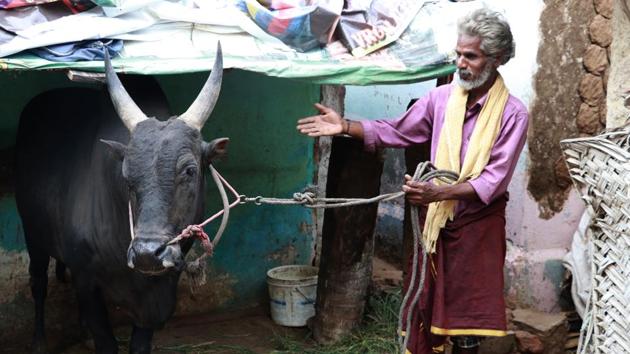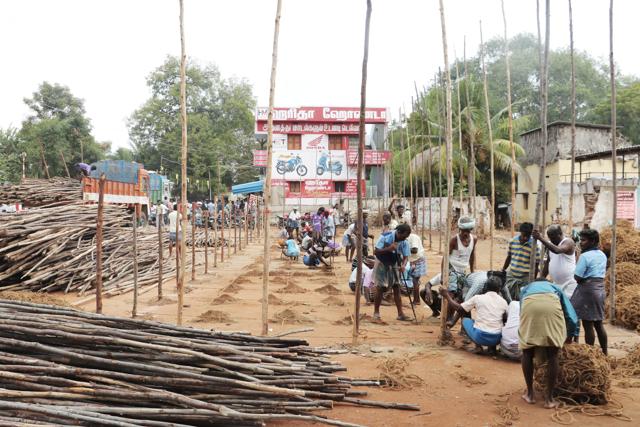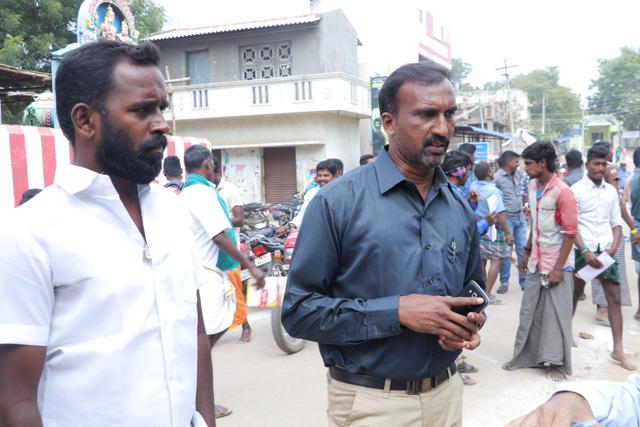This time, Jallikattu will be safer for everyone — bulls, players and spectators
A row over Jallikattu, a bull-taming event in Tamil Nadu, had brought the state to a halt last year till the Union government found a way around the ban imposed on the sport by the Supreme Court.
Jallikattu is all set to be a much safer sport this year, thanks to strict regulations, tight security and thorough health check-ups put in place by the government.

These bull-taming events are held for nearly six months every year, kicking off on Pongal. Six-member Animal Welfare Board of India (AWBI) teams have been visiting various Jallikattu venues to ensure that the bulls are not ill-treated. The practice of weeding out unfit participants from the contests has been welcomed by everybody from organisers to spectators descending on Aviniapuram, Palamedu and Alanganallur – the three main Jallikattu venues in the state.
Aviniapuram kicks off its leg of the bull-taming sport on Sunday. Nearly half a kilometre of the stretch leading up to the bull-collection point has been barricaded to ensure that spectators are not harmed. No vehicle or person will be allowed onto the bulls’ path.

Public interest in the sport has increased manifold, mostly due to last year’s statewide agitation for its revival. The Allanganallur Jallikattu committee has already received Rs 10 lakh in donations, and people in Palamedu are also pitching in. Local sponsors offer prizes ranging from gold coins to consumer durables and two-wheelers. Allanganallur – hailed as the Mecca of Jallikattu celebrations – witnessed a police lathi-charge on Friday, after huge crowds tried to break into the player registration office.
Ranjit Pandian, a 35-year-old software engineer settled in Bengaluru, figured among the successful candidates. With 15 years of bull-taming experience under his belt, he will first face the bulls at Aviniapuram, followed by Palamedu and – lastly – Alangannallur.
“It is purely out of passion for the sport that I have come here,” said Pandian, who is regarded as a bull-tamer of repute. “I will participate at Aviniyapuram, Palemedu and few other events before heading back to Bengaluru.”

Though Pandian believes that the new rules and regulations will only help the sport, he hopes the authorities will also take steps to cut through the red tape. “It would help greatly if they established a centralised registration system and permitted certified bull tamers to bypass the most basic formalities,” the Jallikattu enthusiast said.
Meanwhile, many families steeped in the bull-taming tradition are exuberant about winning back their right to participate in the sport. N Thangavelu may be 67, but he never lets age come between him and his passion for the sport.
Proudly displaying all the scars and fracture marks on his body from past encounters with rampaging bovines, he says: “Just transporting my bulls to distant places costs a minimum of Rs 5,000, and – on top of that – there’s all the special feed I end up buying. My children wonder why I spend over a lakh rupees on Jallikattu every year. The thing is – my prize-winning animals fetch me recognition. I am well known across Tamil Nadu as ‘Palemedu Maattukaran (bull-owner from Palemedu).”

Meanwhile, the bulls are being groomed for the big event too. Their owners put them through rigorous training and exercise sessions, which include running and swimming.
SR Ramar, a 50-year-old milkman from Avaniapuram, regards a bull handed to him by his late father as his most prized possession. He says the 23-year-old animal – lovingly referred to as Arulu – has won over 200 prizes in competitions through the years. “Why, even the cot I sleep on was won by my Arulu!” Ramar exclaims.
Meanwhile, Madurai collector K Veera Raghava Rao claimed that this edition of Jallikattu would be a safe affair. “Around 1,000 players and an equal number of bulls have been registered for the events at the three villages, but not all of them will be allowed in,” he said. “Another round of medical tests will be held on the day of the event, and those failing it will be sent out.”

Rao said local audit committees will constantly monitor the event through CCTV cameras. “The number of bulls and players will also be strictly regulated to ensure minimal chances of injury. While 50 bulls will be released per hour at Alangannallur, 100 will be allowed in that duration in the larger Palamedu arena. A maximum of 75 tamers will be allowed at a time,” he added.
There will be ten teams of medical personnel in place at each venue, besides an equal number of ambulances and four mobile health squads. Ten teams of veterinarian doctors will also be deployed to ensure timely aid for the animals.
Four fire tenders and around 5,000 policemen would also be deployed to prevent untoward incidents. The events will be held from 9am to 3pm, with no possibility of being extended.





